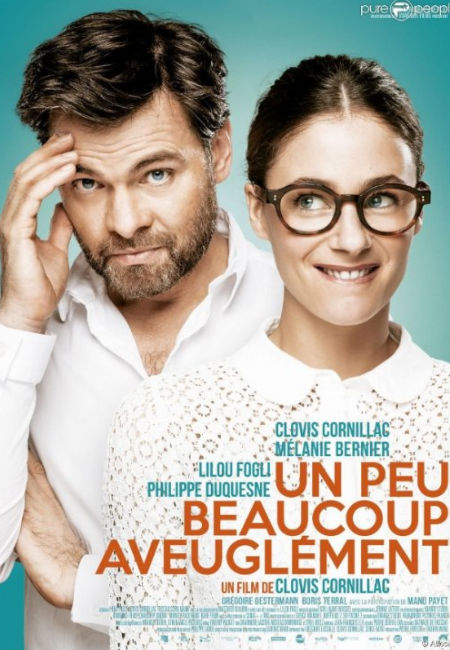
You know the story. Girl moves into apartment. Guy in neighbouring apartment pretends to haunt her to scare her off. She wises up. A battle of wills ensues until true love blossoms but they don’t meet preferring to stay behind their respective walls and … wait, what?
If you think that sounds a little bit of a departure from the usual romantic comedy fare, you would be both right and wrong.
Clovic Cornillac’s delightful film Un peu beaucoup aveuglément, translated in English as Blind Date – which to be honest sounds a lot less fun but is undeniably accurate – both cleaves strongly to classic golden age rom-com tropes while simultaneously having a great deal of fun with them.
In structure at least, Blind Date shares a great deal of narrative DNA with rom-coms from the golden age of Hollywood, the ones starring Doris Day and Rock Hudson or Katharine Hepburn and Spencer Tracy, which relied a great deal on a ridiculously over the top contrivances that the talented cast simply make work.
What initially seemed fantastical quickly became delightfully fanciful as the couple-to-be found themselves in close proximity in ways neither of them ever envisaged.
Much like Pillow Talk which saw Doris Day and Rock Hudson dueling over crossed phone lines, Blind Date employs the idea of two characters forced into uncomfortably close quarters only to find (eventually) that the proximity is not such a bad thing after all.
Of course Machine (Mélanie Bernier), a talented but repressed pianist, recently broken up with her older emotionally-abusive piano teacher boyfriend Evguenie (Grégoire Oestermann) and Machin (Clovis Cornillac), a reclusive, socially-averse creator of intricate puzzles who relies on his friend Artus (Philippe Duquesne) for groceries and companionship, don’t exactly see even remotely eye-to-eye at first.
(Their names are pseudonyms that roughly translate as Whatshisname and whatshername, which reinforces the idea that they are getting to know the real person unencumbered by names, appearance or the usual face-to-face social pressures.)
Or to be fair till almost at the end of the movie, their two lives separated by the paper-thin walls of their neighbouring buildings which allows them to hear everything the other person says or does.
Once Machine wises up to the fact that her neighbour is waging a weird kind of bizarre scare campaign against her, determined to preserve the absolute piece and quiet essential to the practice of his arcane craft, she sets about doing everything in her power to make his life as miserable as possible, most notably with her piano, a hairdryer and finally a metronome, whose piercing tick-tocks drive the games inventor to distraction.
He retaliates of course with bolts in blenders and a whole host of other industrial-level noises until Machine calls time and they finally talk.
No prizes for guessing that when they do they actually find they like hearing the other talk, laugh, do their thing and that getting together in person may be the most delightful thing that has happened to both of them.
So formulaically opposites attract right? Up to that point, wonderfully so, with Cornillac and Bernier more than up to the task of extracting all last comic morsel from their furious noisy battle and then bringing the ensuing romantic attraction and sweet repartee that rom-com tropes demand after the initial butting of heads.
Where Blind Date takes a pleasing turn from the standard issue rom-com is not drawing the parties together till the final heartwarming scene. It’s all Machine’s idea, the idea being that they keep their separate physical lives while bringing their emotional lives ever closer together.
It’s an unconventional approach that attracts a great deal of incredulity and mirth from Artus and Machine’s sister and closest friend Charlotte (Lilou Fogli) who sit through a highly unusual dinner one night where each serve the same food – Machin is far more accomplished cook than his pianist neighbour leading to some highly enjoyable visual gags – tables pressed up against walls, and conversation, after an initially awkward start, flowing smoothly.
It’s one of the key scenes that make Blind Date work so marvellously well, it’s willingness to both embrace the tropes of the rom-com genre but have a great deal of fun with them too.
What adds some freshness to the formula too is Cornillac’s determination to also make a statement about the state of communication in the modern digital age.
It’s the reason why both of them are happy to subvert the close physicality of standard relationships; by not buying into the appearance-driven, instant-gratification culture mobile-connected around them, they can devote themselves to really getting to know each other.
Rather, the wall between them, which lends the film a lovely theatrical feel again quite similar to the early stages of Pillow Talk, is not so much a barrier as a facilitator of a rich and true exchange of thoughts, ideas and feelings, the kind that might be lost if they were face to face.
But of course there comes a time when this plot device becomes a hindrance rather than a help to the budding lovebirds who are finally forced to admit that being physically close to each other without the wall is far preferable as their relationship progresses than having it perpetually between them.
As a first directorial outing Blind Date is an impressive feat for Cornillac.
It’s funny, bright, clever, full of amusing scenes, crackling dialogue and characters who fuel the narrative than being hostage to its whims.
This is romantic comedy done right – a glorious melding of the past and the present that saying something meaningful about the state of modern communication and romance while serving up a heartwarmingly enjoyable love story that is up there with the best of the genre.